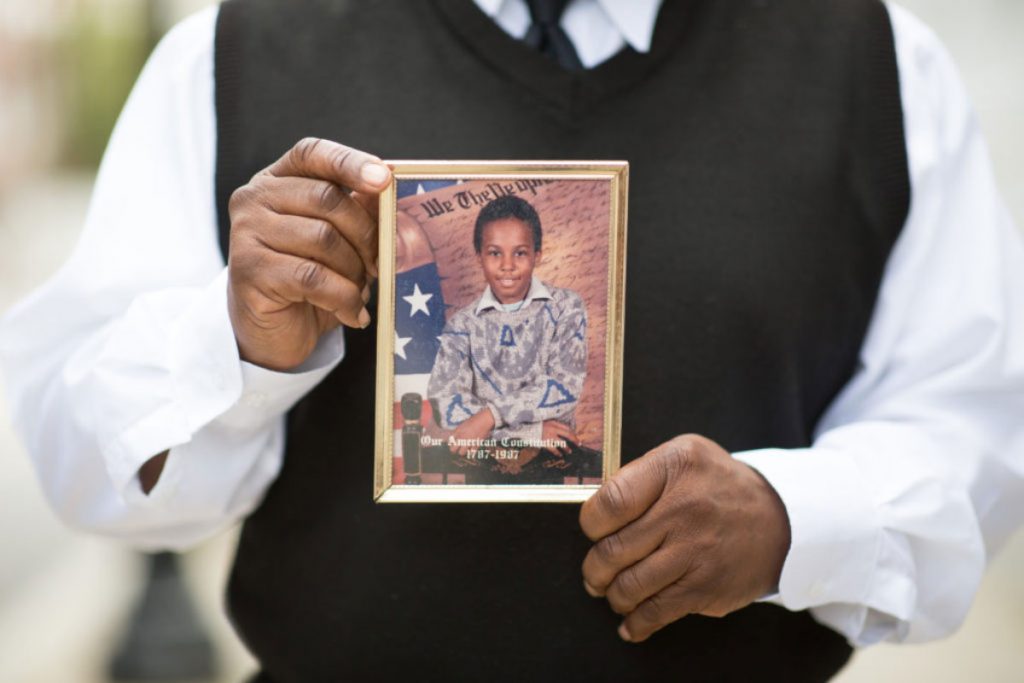Sidebar
Racial Justice Acts of North Carolina and California
Racial discrimination in jury selection represents just one of the myriad ways that race infects the criminal justice system. Recognizing the scope of the problem, North Carolina and California responded to systemic racial injustice with far-reaching solutions.

A photo of Tilmon Golphin, held by his uncle, Willie McCray. On September 25, 2020, Tilmon Golphin was taken off death row and given a life sentence under North Carolina’s Racial Justice Act.
Enacted in 2009, North Carolina’s Racial Justice Act (RJA) required courts to vacate a death sentence if race was a factor in the imposition of the death penalty.1 N.C. Gen. Stat. § 15A-2010 (2009).
Pursuant to the RJA, North Carolina courts conducted two evidentiary hearings related to four death-sentenced individuals: Marcus Robinson, Tilmon Golphin, Christina Walters, and Quintel Augustine.2 Order Granting Appropriate Relief, State v. Robinson, No. 91 CRS 23143 (N.C. Cumberland Co. Super. Ct. Apr. 20, 2012); Order Granting Appropriate Relief, State v. Golphin, No. 97 CRS 47314-15 (Golphin), No. 98 CRS 34832, 35044 (Walters), No. 01 CRS 65079 (Augustine) (N.C. Cumberland Co. Super. Ct. Dec. 13, 2012). The evidence established that prosecutors in Cumberland County struck Black jurors at two to three times the rate of non-Black jurors and that Black jurors faced a risk of exclusion four times higher than non-Black jurors in Cumberland County death penalty trials.3 Order Granting Appropriate Relief at 174-75, State v. Robinson, No. 91 CRS 23143; Order Granting Appropriate Relief at 66-69, 72, State v. Golphin, No. 97 CRS 47314-15 (Golphin), No. 98 CRS 34832, 35044 (Walters), No. 01 CRS 65079 (Augustine).
The RJA hearings also uncovered evidence of two Batson-evasion training sessions hosted by the North Carolina Conference of District Attorneys in 1995 and 2011.4 Order Granting Appropriate Relief at 111, State v. Robinson, No. 91 CRS 23143; Order Granting Appropriate Relief at 4-5, State v. Golphin, No. 97 CRS 47314-15 (Golphin), No. 98 CRS 34832, 35044 (Walters), No. 01 CRS 65079 (Augustine). These trainings have “emphasized how to avoid a Batson violation rather than how to avoid conscious or unconscious discrimination.”5 Order Granting Appropriate Relief at 76, State v. Golphin, No. 97 CRS 47314-15 (Golphin), No. 98 CRS 34832, 35044 (Walters), No. 01 CRS 65079 (Augustine); Order Granting Appropriate Relief at 111, State v. Robinson, No. 91 CRS 23143.

Marcus Robinson listens as Cumberland County Senior Resident Superior Court Judge Greg Weeks finds that racial bias played a role in his trial and sentencing and that he should be removed from death row and serve a life sentence instead.
Shawn Rocco/The News & Observer via Associated Press
Prior to the RJA, North Carolina appellate courts had found Batson error in only one case.6 State v. Robinson, 846 S.E.2d 711, 716 & n.4 (N.C. 2020). Cumberland County Superior Court Judge Weeks, who presided over the RJA evidentiary hearings, noted in his first order granting relief that, despite Batson, discrimination had remained “a significant problem that will not be corrected without a conscious and overt commitment to change.”7 Order Granting Appropriate Relief at 115, State v. Robinson, No. 91 CRS 23143. Judge Weeks granted RJA relief in all four cases and removed all four claimants from death row.8 Order Granting Appropriate Relief at 110-11, State v. Robinson, No. 91 CRS 23143; Order Granting Appropriate Relief at 210, State v. Golphin, No. 97 CRS 47314-15 (Golphin), No. 98 CRS 34832, 35044 (Walters), No. 01 CRS 65079 (Augustine).
Researchers analyzed the impact of North Carolina’s RJA on jury selection in cases following its enactment. The researchers found that although prosecutors continued to use peremptory strikes at a higher rate against Black jurors than against all other jurors, the disparity decreased after the passage of the RJA.9 Barbara O’Brien and Catherine M. Grosso, “Beyond Batson’s Scrutiny: A Preliminary Look at Prosecutorial Peremptory Strikes Following the Passage of the North Carolina Racial Justice Act,” University of California at Davis Law Review 46 (2013): 1637. Further, by putting race at the forefront of the entire legal system and by holding prosecutors accountable for the process rather than just the outcome of the case, the RJA may be more effective than Batson at preventing attorneys from relying on race during the jury selection process.10 O’Brien and Grosso, “Beyond Batson’s Scrutiny,” at 1654.
In the face of overwhelming evidence that racial bias had infected death penalty cases in North Carolina, the state legislature repealed the RJA in 2013, made the repeal retroactive, and returned the four successful RJA claimants back to death row.11 Repeal of Racial Justice Act, S.L. 2013-154, 2013 Gen. Assemb., § 5.(a) (N.C. 2013).
With 100% of claimants successfully proving their entitlement to relief and with more than 100 additional RJA claims filed, the vast majority of individuals on death row were on the precipice of an opportunity to individually demonstrate that the proceedings in which they were sentenced to death were fundamentally flawed by racial animus. Rather than allowing these proceedings to follow their course, the General Assembly repealed the Act.12 Robinson, 846 S.E.2d 711 at 714.
In June 2020, the North Carolina Supreme Court declared the repeal’s retroactivity provision unconstitutional and upheld the previous grants of relief, thereby protecting the rights of over 100 death-sentenced North Carolinians to continue litigating RJA claims filed prior to the repeal.13 State v. Burke, 843 S.E.2d 246, 249 (N.C. 2020) (finding RJA repeal unconstitutional and authorizing RJA movants who filed before the repeal to continue litigating their claims of racial discrimination); State v. Ramseur, 843 S.E.2d 106 (N.C. 2020) (same); Robinson, 846 S.E.2d 711 (upholding commutation of Mr. Robinson’s death sentence).

Shirley Burns, right, hugs a family friend after Superior Court Judge Greg Weeks deemed that the prosecutors in the trial of her son Marcus Robinson had engaged in racially discriminatory behavior.
Raleigh News & Observer/Getty
In 2020, California became the second state to pass legislation addressing racial discrimination in the criminal justice system. California’s Racial Justice Act extends beyond capital cases and makes it illegal for any state actor to obtain a conviction or sentence on the basis of race.
Evidence of bias includes racially discriminatory language, racial discrimination in jury selection, or evidence that state actors sought or obtained convictions for more serious crimes or imposed more severe sentences against individuals of color.14 A.B. 2542, 2019-2020 Leg., Reg. Sess. (Cal. 2020).
The California RJA empowers trial judges to remedy violations by dismissing sentence enhancements, vacating convictions or sentences, and exempting defendants’ executions.
Assemblyman Ash Kalra, an author of the California act, encouraged legislatures in other states to enact similar legislation. “We can no longer accept racial bias in the criminal justice system as unfixable,” he said in a statement. “State legislatures concerned about racial bias in the criminal justice system should act to address it.”15 The California Racial Justice Act, Hearing on A.B. 2542, Before the S. Pub. Safety Comm., 2019-2020 Leg., Reg. Sess. (Cal. 2020) (statement of Ash Kalra, Assembly Member and bill author).